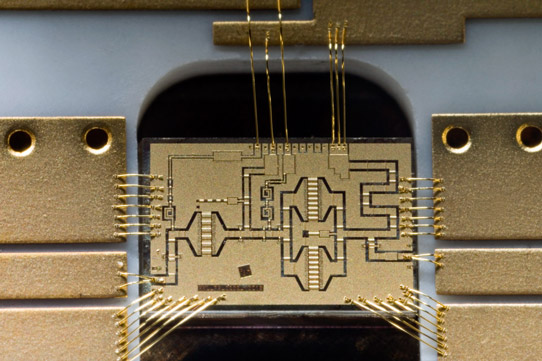- News
29 November 2019
FBH-led project ‘power transistors based on AlN (ForMikro-LeitBAN)’ launched
Coordinated by the Ferdinand-Braun-Institut, Leibniz-Institut für Höchstfrequenztechnik (FBH) of Berlin, Germany, the recently launched joint project ‘power transistors based on AlN (ForMikro-LeitBAN)’ aims to develop highly efficient power semiconductors that can pave the way for a wide range of novel applications – from e-mobility to artificial intelligence.
Smart energy supply, electro-mobility, broadband communication systems and applications of artificial intelligence (AI) are driving constant growth in the number of interacting and interconnected systems. However, with the growing number of systems and increasing data traffic, primary energy consumption is also rising. Electrical energy must be converted at all times to be usable by the various systems, which is why the need for electrical conversion is also increasing. In Europe alone, it is estimated that more than 3TeraWatt-hours of energy (the amount of electricity produced by a medium-sized coal-fired power plant) are lost by energy conversion each year. Efficient energy conversion is therefore key for applications like AI and Industry 4.0 (representing the fourth industrial revolution based on digitization processes in manufacturing). The prerequisite for this are efficiently switching power semiconductors that enable high power density. Used to a large extent, this would result in noticeable energy savings and make a relevant contribution to CO2 reduction.
The project aims to develop aluminium nitride (AlN) semiconductor material for this task, to test it with suitable devices and to qualify it for future applications in systems. Until 2023, the project will be funded with €3.3m by Germany’s Federal Ministry of Education and Research (BMBF) within the program ForMikro (Forschung für neue Mikroelektronik).
Aluminum nitride – starting material with potential
The efficiency of systems is limited by static and dynamic power losses of semiconductors, determined by the respective material. It is becoming increasingly difficult to increase the efficiency of electrical converters and power amplifiers with conventional silicon-based power components. New semiconductor materials with improved properties must therefore be investigated and brought to market maturity, says FBH. The project partners aim to use aluminum nitride (AlN), which has so far been little studied for electronic applications but offers up to 10,000 times less conduction losses than silicon devices. It is also characterized by very high breakdown strength and thermal conductivity – ideal prerequisites for power semiconductors with high energy density and efficiency. Free-standing insulating AlN wafers are to be used and qualified as the substrate. Compared to AlN epitaxy on foreign substrates such as silicon carbide (SiC), the dislocation density can be reduced by five orders of magnitude. This offers the potential for fast and efficient switching devices while maintaining high reliability.

Picture: Gallium nitride amplifier from an earlier FBH project. In the ForMikro-LeitBAN project, the technology for millimeter waves is to be transferred to aluminum nitride. (© FBH/schurian.com)
Full process chain – from crystal growth to system demonstrators
From a conceptual point of view, the novel AlN components are based on well-researched GaN technology. A new aspect is the transition from conventional foreign substrates such as silicon carbide, sapphire or silicon to free-standing AlN substrates. ForMikro-LeitBAN is researching the development of such AlN wafers and testing them in a tailor-made device process. Test systems for millimeter-wave applications and for power electronic energy converters qualify the new highly efficient AlN devices for applications in corresponding systems.
ForMikro-LeitBAN involves the following partners, which collectively span the entire value chain (from AlN wafers to both millimeter-wave and power electronic systems):
- Ferdinand-Braun-Institut (FBH): AlN device design and development;
- Fraunhofer IISB, Erlangen (IISB): AlN crystal growth, wafer manufacturing;
- TU Bergakademie-Freiberg (IAP): Process module development, analytics;
- Friedrich-Alexander-Universität Erlangen-Nürnberg (FAU): material analysis;
- Brandenburgische Technische Universität Cottbus-Senftenberg (BTU): AlN millimetre-wave systems;
- Technische Universität Berlin (TUB): AlN power electronic systems.
The technology will also be prepared for transfer of into an industrial environment. The consortium’s work is hence being supported by an industrial advisory board comprising Infineon for power electronics, UMS for millimetre-wave technology and III/V-Reclaim for the recycling of AlN wafers. A respective follow-up project is also planned.


